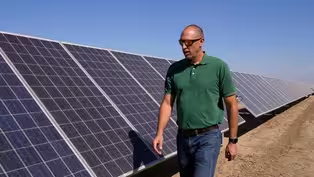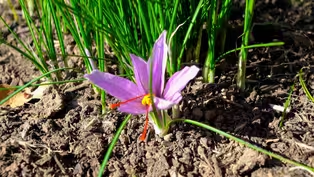
Alabama Lumber Mill
Clip: 6/30/2023 | 4m 2sVideo has Closed Captions
Tour a lumber mill in Alabama.
Tour a lumber mill in Alabama, a state that’s become one of the leading timber producers in the nation.
Problems playing video? | Closed Captioning Feedback
Problems playing video? | Closed Captioning Feedback
America's Heartland is presented by your local public television station.
Funding for America’s Heartland is provided by US Soy, Sustainable Agriculture Research and Education, Rural Development Partners, and a Specialty Crop Grant from the California Department of Food and Agriculture.

Alabama Lumber Mill
Clip: 6/30/2023 | 4m 2sVideo has Closed Captions
Tour a lumber mill in Alabama, a state that’s become one of the leading timber producers in the nation.
Problems playing video? | Closed Captioning Feedback
How to Watch America's Heartland
America's Heartland is available to stream on pbs.org and the free PBS App, available on iPhone, Apple TV, Android TV, Android smartphones, Amazon Fire TV, Amazon Fire Tablet, Roku, Samsung Smart TV, and Vizio.
Providing Support for PBS.org
Learn Moreabout PBS online sponsorship♪♪ When you think of the logging and timber industry, people often think of the misty gray Pacific Northwest.
But in recent years, southern states like Alabama, Mississippi and Georgia have become some of America's leading timber producers.
[Brian Luoma] And the reason for that is because of the massive growth of the timber that's been here.
When... when we went through the downturn, lumber production was really low during the recession.
This timber just kept growing and growing.
Much of that timberland surrounds the rural town of Thomasville, Alabama.
Here, in the heart of timber country, people have long been making a living from the nearby forest.
[Sheldon Day] The timber industry has been the backbone of our community for many, many years.
We've got five pulp and paper mills within a 42 mile radius of Thomasville, everything from Northern tissue and Brawny paper towels to cardboard boxes and you name it, not to mention numerous lumber mills and other facilities, such as Westervelt.
The Westervelt Company began in 1884 and is still in family hands.
Westervelt owns large swaths of timberland and two lumber mills in Alabama, including this newly opened mill in Thomasville that's about as high tech as it gets.
[Brian] I think a lot of people have a vision of the lumber industry or a sawmill as being this sort of dark and dreary, sort of arcane, archaic process.
And what they probably don't realize is it's... it's really not that anymore.
It's... it's high tech, it's high efficiency.
[Justin Gary] You know, you really don't think of making a two by four as being something like this, um, as fast as it runs.
Well, we're moving stuff to the thousands at very high speeds.
High speeds mean high capacity.
More than 150 trucks arrive at the Thomasville Mill every day, where they're unloaded in just a single bite by a massive crane.
Once the logs are unloaded, the bark is removed.
Then, they're scanned, cut, trimmed, dried and processed.
It takes about two weeks for a log to be made into the kind of board you might buy at your local home improvement store.
[India Dixon] Main thing that I do here at Westervelt, as shipping supervisor, is making sure that our products get to the customer, we're sending out a quality product.
Driver's coming around for two by six number two, ten foot.
Do you want him between the sheds?
- Yeah.
[India] I was born and raised here in Thomasville, Alabama, so I've lived here, um, off-and-on for 50 years.
Thomasville has always been a small town, more like a family than a town.
So, Westervelt coming here has brought, um, people from surrounding areas here to work.
Bringing people here to work is one of the bigger goals of the mill.
It opened in 2021 after about a year and a half of construction.
150 people work here, but the real number may be higher.
[Justin] With timber industries specifically, uh, there's a three-to-one or more equivalent to indirect jobs that come with those 150 jobs, because somebody's got to harvest the timber, somebody's got to, uh, service the equipment that harvests the timber, then it's processed.
And then, when it's processed, you have another trucking site that trucks it out or rail, et cetera.
So, you have additional jobs that come with any one timber industry.
Westervelt leaders say the new mill is part of a larger cycle that both starts and ends with the planting of a tree.
[Brian] And that's what the beauty of the... the way forestry works in the South is that this- the... the soils here and the land here is really suited for growing trees and... growing trees and harvesting trees, and then growing them again.
♪♪
Video has Closed Captions
Clip: 6/30/2023 | 4m 49s | A tomato farmer adds solar panels to farmland that’s been affected by drought. (4m 49s)
White Bean and Beef Stew – Farm to Fork with Sharon Profis
Video has Closed Captions
Clip: 6/30/2023 | 4m 55s | We’ll walk you through the steps to cook a hearty White Bean and Beef Stew. (4m 55s)
Video has Closed Captions
Clip: 6/30/2023 | 5m 53s | An urban couple realizes their dream by moving to the country and growing saffron. (5m 53s)
Providing Support for PBS.org
Learn Moreabout PBS online sponsorship

- Food
Christopher Kimball’s Milk Street Television
Transform home cooking with the editors of Christopher Kimball’s Milk Street Magazine.












Support for PBS provided by:
America's Heartland is presented by your local public television station.
Funding for America’s Heartland is provided by US Soy, Sustainable Agriculture Research and Education, Rural Development Partners, and a Specialty Crop Grant from the California Department of Food and Agriculture.



